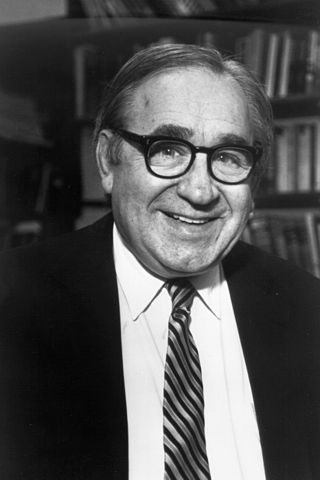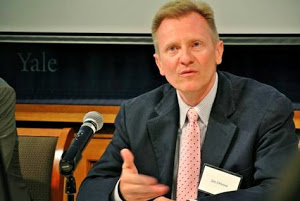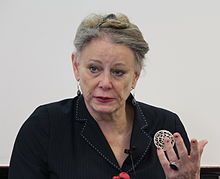Econometrics is an application of statistical methods to economic data in order to give empirical content to economic relationships. More precisely, it is "the quantitative analysis of actual economic phenomena based on the concurrent development of theory and observation, related by appropriate methods of inference." An introductory economics textbook describes econometrics as allowing economists "to sift through mountains of data to extract simple relationships." Jan Tinbergen is one of the two founding fathers of econometrics. The other, Ragnar Frisch, also coined the term in the sense in which it is used today.

Economic history is the study of history using methodological tools from economics or with a special attention to economic phenomena. Research is conducted using a combination of historical methods, statistical methods and the application of economic theory to historical situations and institutions. The field can encompass a wide variety of topics, including equality, finance, technology, labour, and business. It emphasizes historicizing the economy itself, analyzing it as a dynamic entity and attempting to provide insights into the way it is structured and conceived.

The bourgeoisie are a class of business owners and merchants which emerged in the Late Middle Ages, originally as a "middle class" between peasantry and aristocracy. They are traditionally contrasted with the proletariat by their wealth, political power, and education, as well as their access to and control of cultural, social and financial capital.
The Chicago school of economics is a neoclassical school of economic thought associated with the work of the faculty at the University of Chicago, some of whom have constructed and popularized its principles. Milton Friedman, and George Stigler are considered the leading scholars of the Chicago school.

Cliometrics, sometimes called 'new economic history' or 'econometric history', is the systematic application of economic theory, econometric techniques, and other formal or mathematical methods to the study of history. It is a quantitative approach to economic history.

George Joseph Stigler was an American economist. He was the 1982 laureate in Nobel Memorial Prize in Economic Sciences and is considered a key leader of the Chicago school of economics.

Robert William Fogel was an American economic historian and scientist, and winner of the 1993 Nobel Memorial Prize in Economic Sciences. As of his death, he was the Charles R. Walgreen Distinguished Service Professor of American Institutions and director of the Center for Population Economics (CPE) at the University of Chicago's Booth School of Business. He is best known as an advocate of new economic history (cliometrics) – the use of quantitative methods in history.
The McCloskey critique refers to a critique of post-1940s "official modernist" methodology in economics, inherited from logical positivism in philosophy. The critique maintains that the methodology neglects how economics can be done, is done, and should be done to advance the subject. Its recommendations include use of good rhetorical devices for "disciplined conversation."

James R. Otteson is an American philosopher and political economist. He is the John T. Ryan Jr. Professor of Business Ethics at the University of Notre Dame. Formerly, he was the Thomas W. Smith Presidential Chair in Business Ethics, Professor of Economics, and executive director of the Eudaimonia Institute at Wake Forest University. He is also a Senior Scholar at The Fund for American Studies in Washington, D.C., a Research Professor in the Center for the Philosophy of Freedom and in the Philosophy Department at the University of Arizona, a Visitor of Ralston College, a Research Fellow for the Independent Institute in California, a director of Ethics and Economics Education of New England, and a Senior Scholar at the Fraser Institute. He has taught previously at Yeshiva University, New York University, Georgetown University, and the University of Alabama.
Economic methodology is the study of methods, especially the scientific method, in relation to economics, including principles underlying economic reasoning. In contemporary English, 'methodology' may reference theoretical or systematic aspects of a method. Philosophy and economics also takes up methodology at the intersection of the two subjects.

Claudia Dale Goldin is an American economic historian and labor economist. She is the Henry Lee Professor of Economics at Harvard University. In October 2023, she was awarded the Nobel Memorial Prize in Economic Sciences "for having advanced our understanding of women's labor market outcomes”. The third woman to win the award, she was the first woman to win the award solo.
Stephen T. Ziliak is an American professor of economics whose research and essays span disciplines from statistics and beer brewing to medicine and poetry. He is currently a faculty member of the Angiogenesis Foundation, conjoint professor of business and law at the University of Newcastle in Australia, and professor of economics at Roosevelt University in Chicago, IL. He previously taught for the Georgia Institute of Technology, Emory University, and Bowling Green State University. Much of his work has focused on welfare and poverty, rhetoric, public policy, and the history and philosophy of science and statistics. Most known for his works in the field of statistical significance, Ziliak gained notoriety from his 1996 article, "The Standard Error of Regressions", from a sequel study in 2004 called "Size Matters", and for his University of Michigan Press best-selling and critically acclaimed book The Cult of Statistical Significance: How the Standard Error Costs Us Jobs, Justice, and Lives (2008) all coauthored with Deirdre McCloskey.
Charles Knickerbocker Harley is an academic economic historian who has written on a wide range of topics including the British industrial revolution, the late nineteenth century international economy, and the impact of technological change. He is a practitioner of the New Economic History.
Richard Charles Sutch was a professor of economics at the University of California Riverside. He is noted for his work on the economic analysis of U.S. slavery and emancipation. He was awarded a "Clio" Award For Exceptional Support to the Field of Cliometrics, by the Cliometric Society and his work has received recognition by the Economic History Association via its awarding him the Arthur H. Cole Prize for the Outstanding Article in The Journal of Economic History. Over the period 1989-1990 he served as the president of the Economic History Association.
Jack L. Amariglio is a North American heterodox economist. He is well known for his work on economic history, class analysis, and on economic methodology and postmodernism in economics.

Amélie Oksenberg Rorty was a Belgian-born American philosopher known for her work in the philosophy of mind, history of philosophy, and moral philosophy.

Bourgeois Dignity: Why Economics Can’t Explain the Modern World is a 2010 book by economist and social theorist Deirdre McCloskey that is the second of a three-book series laying out the thesis that a change in the rhetoric surrounding the value of business, innovation, and entrepreneurship was the main factor responsible for the takeoff of economic growth in Northwest Europe in the late 18th century. Bourgeois Dignity focuses on arguing that there was a fairly significant and unprecedented takeoff of economic growth, and that existing explanations for this takeoff are inadequate. McCloskey provides a rough outline for why she thinks that the changes in rhetoric surrounding the dignity of business and markets were crucial, but leaves the elaborate case for later books in the series.
Robert Green McCloskey was an American political historian.










